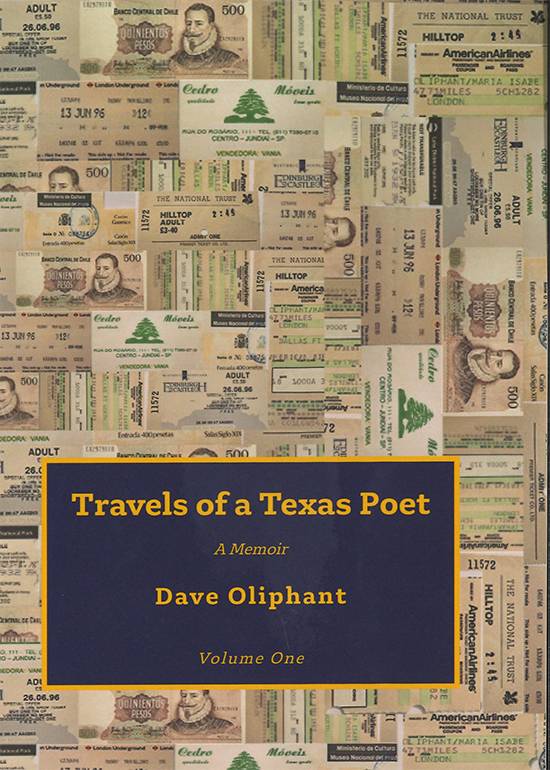
Travels of A Texas Poet
by Dave Oliphant
Austin: Alamo Bay Press, 2021.
371pp. $38.00. paperback.
Reviewed by
Charmaine Denison-George
“A helpful approach to reading this volume of work is to understand a) the context: poet, Texan; b) the times: two or three decades ago as seen in the absence of GPS and then c) the plight: not exactly a travel log but a collection of notes and observations about the culture and poetry that influenced Oliphant’s work.”
Travels of A Texas Poet, is a witty memoir of art and culture. This first of a two volume work details Oliphant’s travels in America and Europe and spans two decades. Oliphant’s memoir invites readers to witness the expansive worldview that traveling permits. At times Travels of A Texas Poet offers so much in scope and content that it leaves one confused about the inherent aim of the work. Is the reader to focus on the backstories behind Oliphant’s poetry writes or the travel logs of impressive towns and cities visited? The lack of a central focus is what renders this book both delightfully dense and exhausting.
Divided into four chapters, the memoir details Oliphant’s travels across the United States, Spain, England, and Scotland. Oliphant pays special attention to the literature, art, and infrastructure of the cities he visits. Of Trafalgar Square, for example, he notes that “so much had been written of this sight that on seeing it I was greatly disappointed.” Of Spain, there was generally a more endearing outlook with remarks like, “Somehow I had not expected to find myself feeling so relaxed in Spain.” or “Cars were smaller […] the Spanish tradition [is] more angular in design, allowing for parks and curving streets, perhaps due in part to the Arab presence before 1492.” Readers also gain insight into the poet’s intentionality in recording his experiences when some of these notes are urgently written behind boarding passes and others are carefully written on notebooks bought specially for that purpose.
A helpful approach to reading this volume of work is to understand a) the context: poet, Texan; b) the times: two or three decades ago as seen in the absence of GPS and then c) the plight: not exactly a travel log but a collection of notes and observations about the culture and poetry that influenced Oliphant’s work. Additionally, Oliphant has written this book in honor of his late wife, Maria, on which matter he writes, “The notes are especially important to me because Maria appears in them with her wonderful way with words in both Spanish and English, reminding me of all the joy that she brought to me, to our extended family, and to all who knew her warmth and wit and wisdom.” This information about the influence and inspiration for the book would soften the reader to make an emotional connection with the work.
One of the most notable aspects of the book is that bits of Oliphant’s poems are featured. However, the focus remains on the poems’ backstories. Many of Oliphant’s nuanced observations could have been cut. Do readers need to know the details of Oliphant’s initial impressions of paintings by Rubens and Jan Brueghel in Spain? Not to mention the entire page dedicated to the conditions in which Oliphant experienced Oscar Wilde’s essay, “The Critic as Artist.” In no time, what was initially an exciting log of travels becomes a daunting task to follow along with the cities and the inspiration for each poem. For example, in his first poem about Spain — which is also printed in the book— “The Tourist’s Came Home to Roost”, Oliphant writes:
“I cannot remember whether or not those lines were inspired by the idea that imperialist nations had begun to complain that their colonials were taking up residence in the home countries and were ruining their native culture, but certainly the idea of a return…”
I question how much of the backstory the reader needs to know. I question if another of Oliphant’s brilliant anthologies (see Memories of Texas Towns and Cities (2000) or The Pilgrimage: Selected Poems, 1962-2012 (2013) could not have been brought to reality here with the full poem and a brief exposition of the influences behind the poem. As such, all 371 pages of this book could easily have been a plausible 100.
Despite the overwhelming nature of the observations and too-detailed notes within, there are a few gems that one may pick out from this volume. The first is that as an artist, you should always bring a notebook and pen with you because you never know when inspiration will hit you. The second is the fact that Oliphant has shown and not merely told of how traveling equals knowledge equals intellectual power. Oliphant does this with an exposition of what he calls, “the value of travel” and proceeds to quote Mohammed Ali and Mark Twain in their similar views of traveling. But again, the bottom line is, remember to take a notebook with you next time you travel, even if it’s just a trip downtown because you just never know!
Charmaine Denison-George is a first-year MFA Creative Writing-Fiction candidate at Texas State University.
